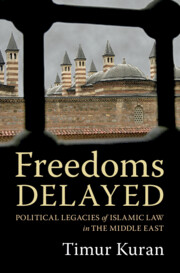Book contents
- Freedoms Delayed
- Freedoms Delayed
- Copyright page
- Dedication
- Contents
- Figures
- Tables
- Preface
- Part I The Modern Middle East’s Authoritarian Face
- Part II Persistent Social Atomization
- 3 Nongovernmental Organizations under Islamic Law
- 4 The Political Impotence of Islamic Waqfs
- 5 Waqf Corruption and Its Degradation of Civic Life
- 6 The Islamic Waqf’s Long Civic Shadow
- Part III Religious Repression
- Part IV Economic Hindrances
- Part V Conclusion
- Notes
- Bibliography
- Index
4 - The Political Impotence of Islamic Waqfs
from Part II - Persistent Social Atomization
Published online by Cambridge University Press: 20 July 2023
- Freedoms Delayed
- Freedoms Delayed
- Copyright page
- Dedication
- Contents
- Figures
- Tables
- Preface
- Part I The Modern Middle East’s Authoritarian Face
- Part II Persistent Social Atomization
- 3 Nongovernmental Organizations under Islamic Law
- 4 The Political Impotence of Islamic Waqfs
- 5 Waqf Corruption and Its Degradation of Civic Life
- 6 The Islamic Waqf’s Long Civic Shadow
- Part III Religious Repression
- Part IV Economic Hindrances
- Part V Conclusion
- Notes
- Bibliography
- Index
Summary
Islamic waqfs did not produce a vigorous civil society. On the contrary, they inhibited mass political participation and collective civic action through several channels. Firstly, a waqf’s beneficiaries had no say over its activities. Second, each waqf was required to provide services on its own, which kept it from participating in political coalitions. Third, the waqf’s beneficiaries played no formal role in appointing its officers. Such organizational features constitute key reasons why, as the West developed political checks and balances, no such tendency emerged in the Middle East. The West liberalized and democratized through epic struggles involving universities, cities, religious orders, and guilds, all organized as corporations. Challenging power structures, such corporations developed ideologies supportive of personal and associational rights. A virtuous circle thus emerged. As civil society strengthened, it took steps to bolster private organizations, which then strengthened civil society further. In the Middle East, by contrast, the waqf created a vicious circle. By keeping civil society weak, it limited freedoms and perpetuated autocracy. The absence of strong nongovernmental organizations made it hard to challenge rulers through organized collective action from outside the state. Tellingly, over more than a millennium, waqfs fostered no political movements or ideologies.
Keywords
- Type
- Chapter
- Information
- Freedoms DelayedPolitical Legacies of Islamic Law in the Middle East, pp. 60 - 76Publisher: Cambridge University PressPrint publication year: 2023



